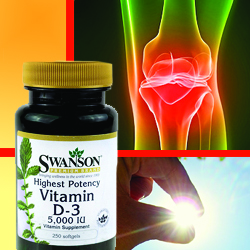No one can deny that we become wiser with age, but pitifully, we start experiencing more pains and sufferings. Fortunately, medical science is progressing as each year goes by, which is beneficial to us, as specialists find all the more solutions to our health problems. Osteoarthritis, or arthrosis, is the most frequent reason for the experienced pains in our knees. If physicians establish this disease, they may only prescribe you the additional administration of vitamin D, which will considerably improve your condition.
 This seemingly easy solution is a result of a series of conducted studies.
This seemingly easy solution is a result of a series of conducted studies.
107 randomly elected patients with a proved osteoarthritis* diagnosis took part in one of the recent studies. Blood tests showed they had vitamin D levels going below 50 nmol/l, which are identified by doctors as insufficient. Patients were divided in 2 groups. The first one had administered 60,000 IU additionally vitamin D3 daily for 10 days, followed by 60,000 IU once monthly for 1 year. The second group was not given additionally vitamin D3.
After the end of the study, participants had to fill-in special questionnaires to assess their motor abilities and the level of the knee pains. Results indicated that the additional vitamin D group reported:
- Considerable reduction of the knees and joints pains;
- Improvement of the motor abilities;
- Better quality of life.
Furthermore, blood tests made to that group in the end of the study showed normal levels of vitamin D3, calcium, and alkaline phosphatase – a protein taking active part in the formation of bones. These results clearly indicate, that:
- Vitamin D is necessary for the body and is processed in the body;
- Vitamin D improves the assimilation of calcium;
- Vitamin D is important for the formation of bones and improves their strength.
 Nevertheless this study is clinically controlled, its authors noted that it was not a large-scaled one and did not allow in a definitive manner to decide on a change in the current medical practice as regards individuals suffering of arthrosis. However, data are statistically significant and definitively give reasons for the conduction of a clinical study with much bigger scope, aimed at answering the major question: should the standard of treatment of individuals suffering of arthrosis include a mandatory administration of Vitamin D3?
Nevertheless this study is clinically controlled, its authors noted that it was not a large-scaled one and did not allow in a definitive manner to decide on a change in the current medical practice as regards individuals suffering of arthrosis. However, data are statistically significant and definitively give reasons for the conduction of a clinical study with much bigger scope, aimed at answering the major question: should the standard of treatment of individuals suffering of arthrosis include a mandatory administration of Vitamin D3?
Regardless of whether or not you administer additional Vitamin D, you should consider the following pieces of advice:
- Consult your healthcare provider!
In the presented study patients were given more rarely Vitamin D3, but instead, in doses higher than the recommended daily administration. Therefore, you should always consult your healthcare provider what supplements and in what quantities would be most suitable for you to take.
- Check your vitamin D level!
The study involved only adults with proved disease and with low Vitamin D content in the blood. But you may suffer of deficiency of this vital vitamin and not be aware of the fact. A blood test would help you establish this for sure.
- Be active!
Regular physical activity may preserve the good functioning of the joints in individuals with a mild to moderate form of osteoarthritis. Nevertheless, if you already experience severe pains, walking, jogging and basketball won’t be within your powers. Just try activities requiring lower exercises, such as biking, swimming, yoga, or aqua aerobics.
- Beware of your weight!
Excessive weight gives additional load to the knee joints. The maintaining of healthy weight is one of the best ways to reduce the risk of developing osteoarthritis and to limit its growth, in case you already have it.
* The results from the referred study are published in Clinical Orthopaedics and Related Research, November 2013.

